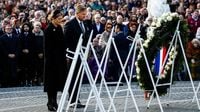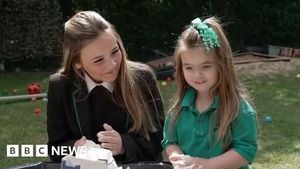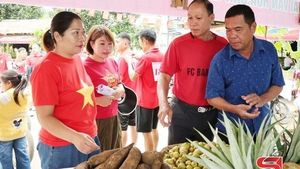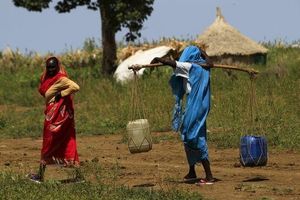On May 4, 2025, Amsterdam's Dam Square was filled with approximately 16,000 people who gathered to observe two minutes of silence in honor of the victims of World War II and other armed conflicts involving the Netherlands. The atmosphere was solemn, as attendees reflected on the sacrifices made for peace and freedom. This year’s commemoration was particularly significant as it marked the 80th anniversary of the liberation from Nazi occupation.
Shortly after the moment of silence, however, tensions flared when two individuals were arrested for shouting "Free Palestine." The police confirmed that a total of six arrests were made on and around Dam Square, citing reasons such as disturbing the commemoration, public drunkenness, and violating area bans. Despite these incidents, the overall tone of the event was described as respectful, with no major disturbances reported during the silence.
The commemoration was organized by the National Committee 4 and 5 May, which expressed satisfaction with the turnout and the conduct of the event. A spokesperson noted, "We look back on a very beautiful commemoration on, fortunately, a very full Dam. There were beautiful stories shared, and after the two minutes of silence, young Marijn van der Wilk delivered an impressive speech." King Willem-Alexander and Queen Máxima were among the dignitaries who laid the first wreath at the National Monument on the Dam.
Prime Minister Dick Schoof delivered a poignant speech, sharing personal reflections about his grandfather, Wim Pommerel, who was executed for his resistance work during the war. Schoof emphasized the importance of remembrance, stating, "It is the echo from the past that calls on us to continue commemorating eighty years after the liberation." His speech, however, was met with mixed reactions; dozens of attendees turned their backs on him in silent protest, a demonstration organized by activist Frank van der Linde, who claimed that the current government is complicit in the ongoing violence in Gaza.
In addition to the main event in Amsterdam, public commemorations occurred in at least 480 locations across the Netherlands, reflecting a nationwide commitment to honor those who have suffered due to war. In Appingedam, for example, the local commemoration was held at the Kerkplein, where Mayor Ben Visser spoke to a large crowd, and the event was broadcast live by NOS, connecting local tributes to the national narrative.
In The Hague, an alternative commemoration was organized by a group called "4 mei inclusief," attended by around 3,000 people. This gathering focused not only on the victims of World War II but also on contemporary conflicts, particularly the situation in Gaza. The organizers expressed gratitude for the turnout, emphasizing the need for inclusive remembrance that acknowledges all victims of war and oppression.
During the alternative event, former PvdA politician and Holocaust survivor Hedy d’Ancona spoke about her father, who was deported and died in a concentration camp. She urged attendees to reflect on the current global situation, stating, "The deportation of more than a hundred thousand Dutch Jews, Sinti, and Roma was also made possible because most people looked away."
Mayor of Amsterdam, Femke Halsema, also participated in the silent march from Museumplein to the Dam, where she linked the historical remembrance of World War II victims to contemporary conflicts. "'Never again' is not a political slogan that sometimes applies and sometimes does not," she stated. "Mothers and children are dying from bombings, and we are watching." Halsema’s remarks resonated with many, as they highlighted the ongoing struggles faced by innocent people in conflict zones around the world.
In various locations, including Kamp Westerbork and Kamp Amersfoort, survivors and relatives shared their stories during commemorative events. At Kamp Westerbork, a rainbow wreath was laid for the first time, honoring LGBTQ+ victims of the Nazi regime. Meanwhile, at Kamp Vught, attendees remembered the approximately 735 individuals who lost their lives there.
The day was filled with various activities across the country, including concerts and public readings, but all paused for the two minutes of silence at 8:00 PM. Notably, in venues like the Ziggo Dome, attendees respected the silence despite the excitement of the events taking place around them.
As the commemorations concluded, discussions emerged in the media regarding the need for stronger responses to current global conflicts, particularly the ongoing violence in Gaza. Several newspapers expressed discomfort with the lack of a more robust Dutch and international reaction to the situation, connecting it to the spirit of "never again" that underpins the annual remembrance.
The National Committee 4 and 5 May emphasized that while the focus of May 4 is to remember those lost in historical conflicts, it is also essential to reflect on the lessons learned and the ongoing responsibilities we hold towards victims of current wars. The sentiment echoed across various platforms, suggesting that remembrance should not only look to the past but also inform actions in the present.
As the nation observed this day of remembrance, it was clear that the echoes of history continue to resonate, prompting both reflection and action in the face of ongoing global challenges.





